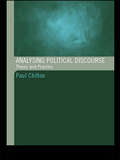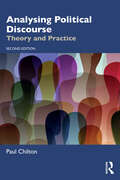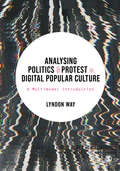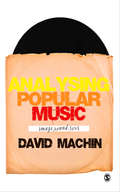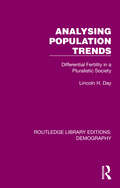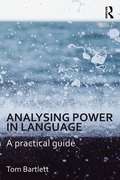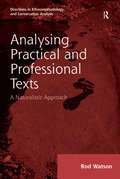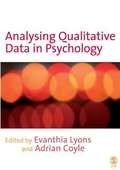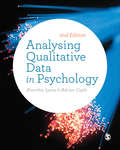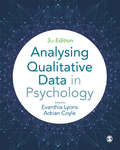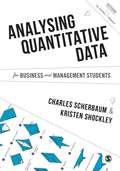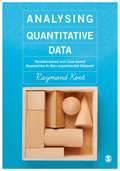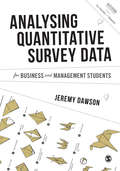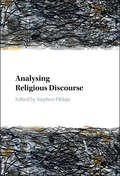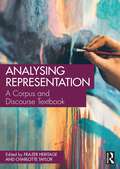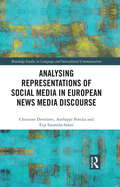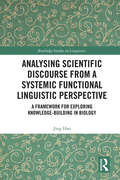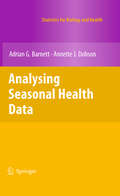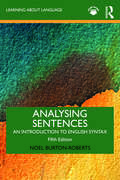- Table View
- List View
Analysing Political Discourse: Theory and Practice
by Paul ChiltonThis is an essential read for anyone interested in the way language is used in the world of politics. Based on Aristotle's premise that we are all political animals, able to use language to pursue our own ends, the book uses the theoretical framework of linguistics to explore the ways in which we think and behave politically. Contemporary and high profile case studies of politicians and other speakers are used, including an examination of the dangerous influence of a politician's words on the defendants in the Stephen Lawrence murder trial.International in its perspective, Analysing Political Discourse also considers the changing landscape of political language post-September 11, including the increasing use of religious imagery in the political discourse of, amongst others, George Bush.Written in a lively and engaging style, this book provides an essential introduction to political discourse analysis.
Analysing Political Discourse: Theory and Practice
by Paul ChiltonIn today’s world, analysing political language is more important than ever. This revised edition, while retaining the historically significant case studies, adds new analyses that reflect the 2010s and 2020s. It retains the original analytical tools, including the discourse space model, and in a fresh chapter advocates development of tools from neuroscience.The book begins by exploring some fundamental questions concerning the relationship between language and politics, putting forward the idea that society, language and politics are closely intertwined. There cannot be any politics, as we know it, without language. The following chapters focus on key aspects of language in relation to political institutions, practices and ideologies: the interaction between speakers and hearers, the projection of different world-views, and the arousal of political emotions. The final chapters are devoted to historical examples of perennial political issues: racism, international conflict and the role of religion.Written in a lively and engaging style with summaries and further reading to aid learning, this book provides an essential introduction to political discourse analysis for students of language, communication, politics sociology, international relations and applied linguistics.
Analysing Politics and Protest in Digital Popular Culture: A Multimodal Introduction
by Lyndon WaySupporting you with varied features throughout, this intriguing new book provides a foundational understanding of politics and protest before focusing on step-by-step instructions for carrying out analysis on your own. It includes up to date cases, such as analysis of memes about Brexit, Trump and coronavirus, that cater for this quickly moving field.
Analysing Politics and Protest in Digital Popular Culture: A Multimodal Introduction
by Lyndon WaySupporting you with varied features throughout, this intriguing new book provides a foundational understanding of politics and protest before focusing on step-by-step instructions for carrying out analysis on your own. It includes up to date cases, such as analysis of memes about Brexit, Trump and coronavirus, that cater for this quickly moving field.
Analysing Popular Music: Image, Sound and Text
by Mr David MachinPopular music is far more than just songs we listen to; its meanings are also in album covers, lyrics, subcultures, voices and video soundscapes. Like language these elements can be used to communicate complex cultural ideas, values, concepts and identities.<P> Analysing Popular Music is a lively look at the semiotic resources found in the sounds, visuals and words that comprise the 'code book' of popular music. It explains exactly how popular music comes to mean so much. Packed with examples, exercises and a glossary, this book provides the reader with the knowledge and skills they need to carry out their own analyses of songs, soundtracks, lyrics and album covers.<P> Written for students with no prior musical knowledge, Analysing Popular Music is the perfect toolkit for students in sociology, media and communication studies to analyse, understand - and celebrate - popular music.
Analysing Population Trends: Differential Fertility in a Pluralistic Society (Routledge Library Editions: Demography #4)
by Lincoln H. DayOriginally published in 1983, this book examines the problems of fertility in predicting population trends. It varies a great deal according to mothers’ ages, ethnic groups, place and time. It is important for demographers, planners and policy-makers to know precisely what fertility differences are, what gives rise to them and how they can be handled and predicted statistically. This volume discusses these challenges in detail and analyses information to show how factors like religion, place of birth and socio-economic grouping affect fertility. .
Analysing Power in Language: A practical guide
by Tom BartlettAnalysing Power in Language introduces students to a range of analytical techniques for the critical study of texts.Each section of the book provides an in-depth presentation of a different method of analysis with worked examples and texts for students to analyse and discuss. Answer keys are also provided for the analyses. Taking text analysis as the first step in discourse analysis, Analysing Power in Language: Explores the relationship between the goals of discourse, the social positions of the speakers, the contexts in which they are produced, the audience for which they are intended and the language features chosen Presents a powerful approach to text analysis that reveals the links between language usage and a community’s assumptions, convictions, and understandings Identifies a range of power types, appropriate to different contexts Explains and illustrates a social approach to text analysis with important linguistic concepts woven in seamlessly with examples of discourse Offers concrete guidance in text and discourse analysis with carefully crafted examples and fully illustrated explanations. Incisive and thought-provoking yet also accessible, Analysing Power in Language will be essential reading for advanced undergraduate, postgraduate and research students studying discourse analysis.
Analysing Practical and Professional Texts: A Naturalistic Approach (Directions in Ethnomethodology and Conversation Analysis)
by Rod WatsonAnalysing Practical and Professional Texts focuses on texts as constituents of human usage, showing how written documents and other 'texts' are integral to social organization. It reveals social organization itself to be not only textually-mediated in nature, but also textually-constituted, showing how texts - professional, technical or otherwise - as well as various social-scientific methodologies employ the resources of ordinary language. Theoretically sophisticated and illustrated with empirical examples, this book will be of interest not only to those with interests in ethnomethodology and conversation analysis, but also to social scientists and anthropologists concerned with text analysis, textual sense and the 'linguistic turn' in the methods of their own disciplines.
Analysing Qualitative Data in Psychology
by Dr Evanthia Lyons Adrian CoyleAnalysing Qualitative Data in Psychology equips students and researchers in psychology and the social sciences to carry out qualitative data analysis, focusing on four major methods (grounded theory, interpretative phenomenological analysis, discourse analysis and narrative analysis). Assuming no prior knowledge of qualitative research, chapters on the nature, assumptions and practicalities of each method are written by acknowledged experts. To help students and researchers make informed methodological choices about their own research the book addresses data collection and the writing up of research using each method, while providing a sustained comparison of the four methods, backed up with authoritative analyses using the different methods.
Analysing Qualitative Data in Psychology
by Adrian Coyle Evanthia LyonsInstructors - Electronic inspection copies are available or contact your local sales representative for an inspection copy of the print version. Analysing Qualitative Data in Psychology is a clear, step-by–step guide linking theory with practice, that offers a unique combination of perspectives on five qualitative approaches: grounded theory, interpretative phenomenological analysis, discourse analysis, narrative analysis and thematic analysis that can be applied to a common data set. This text provides practical advice and guidance from experts as well as a comparison of the different methods, which will help students decide the approach that’s right for them and their research project. The second edition of this text: Introduces a fifth, additional qualitative approach, Thematic Analysis Explores the ethical challenges of qualitative work Takes a look at mixed methods and pluralist research Includes worked-out examples of qualitative analyses and brand new tools for learning, including ‘road maps’ for qualitative analysis Analysing Qualitative Data in Psychology, Second Edition is the perfect text for psychology students engaged in qualitative research or studying research methods, at either undergraduate or postgraduate level.
Analysing Qualitative Data in Psychology
by Adrian Coyle Evanthia LyonsInstructors - Electronic inspection copies are available or contact your local sales representative for an inspection copy of the print version. Analysing Qualitative Data in Psychology is a clear, step-by-step guide linking theory with practice, that offers a unique combination of perspectives on five qualitative approaches: grounded theory, interpretative phenomenological analysis, discourse analysis, narrative analysis and thematic analysis that can be applied to a common data set. This text provides practical advice and guidance from experts as well as a comparison of the different methods, which will help students decide the approach that's right for them and their research project. The second edition of this text: Introduces a fifth, additional qualitative approach, Thematic Analysis Explores the ethical challenges of qualitative work Takes a look at mixed methods and pluralist research Includes worked-out examples of qualitative analyses and brand new tools for learning, including 'road maps' for qualitative analysis Analysing Qualitative Data in Psychology, Second Edition is the perfect text for psychology students engaged in qualitative research or studying research methods, at either undergraduate or postgraduate level.
Analysing Qualitative Data in Psychology
by Adrian Coyle Evanthia LyonsLooking for a practical, comprehensive overview of Qualitative Research Methods? Want to know the best approach to take for you and your research project? This book takes you through five different qualitative approaches – thematic analysis, interpretative phenomenological analysis, grounded theory, narrative analysis and discourse analysis. Applying them all to a common data set, this book gives you step-by-step guidance on each approach and helps you work out which is the right one for you. Plus, with a whole new part on qualitative data collection – including chapters on interviewing, social media data and visual methodologies – this new edition is the ultimate resource for students engaged in qualitative psychological research or studying methods at any level.
Analysing Qualitative Data in Psychology
by Adrian Coyle Evanthia LyonsLooking for a practical, comprehensive overview of Qualitative Research Methods? Want to know the best approach to take for you and your research project? This book takes you through five different qualitative approaches – thematic analysis, interpretative phenomenological analysis, grounded theory, narrative analysis and discourse analysis. Applying them all to a common data set, this book gives you step-by-step guidance on each approach and helps you work out which is the right one for you. Plus, with a whole new part on qualitative data collection – including chapters on interviewing, social media data and visual methodologies – this new edition is the ultimate resource for students engaged in qualitative psychological research or studying methods at any level.
Analysing Quantitative Data for Business and Management Students (Mastering Business Research Methods)
by Kristen M. Shockley Charles A ScherbaumIn Analysing Quantitative Data, Charles A. Scherbaum and Kristen M. Shockley guide the reader through Understanding Quantitative Data Analysis, Basic Components of Quantitative Data Analysis, Conducting Quantitative Data Analysis, Examples of Quantitative Data Analysis and Conclusions. An appendix contains Excel Formulas. Ideal for Business and Management students reading for a Master’s degree, each book in the series may also serve as reference books for doctoral students and faculty members interested in the method. Part of SAGE’s Mastering Business Research Methods Series, conceived and edited by Bill Lee, Mark N. K. Saunders and Vadake K. Narayanan and designed to support researchers by providing in-depth and practical guidance on using a chosen method of data collection or analysis.
Analysing Quantitative Data for Business and Management Students (Mastering Business Research Methods)
by Dr. Charles A Scherbaum Dr. Kristen M. ShockleyIn Analysing Quantitative Data, Charles A. Scherbaum and Kristen M. Shockley guide the reader through Understanding Quantitative Data Analysis, Basic Components of Quantitative Data Analysis, Conducting Quantitative Data Analysis, Examples of Quantitative Data Analysis and Conclusions. An appendix contains Excel Formulas. Ideal for Business and Management students reading for a Master’s degree, each book in the series may also serve as reference books for doctoral students and faculty members interested in the method. Part of SAGE’s Mastering Business Research Methods Series, conceived and edited by Bill Lee, Mark N. K. Saunders and Vadake K. Narayanan and designed to support researchers by providing in-depth and practical guidance on using a chosen method of data collection or analysis. Watch the editors introduce the Mastering Business Research Methods series
Analysing Quantitative Data: Variable-based and Case-based Approaches to Non-experimental Datasets
by Dr Raymond A. KentLecturers, request your electronic inspection copy This innovative book provides a fresh take on quantitative data analysis within the social sciences. It presents variable-based and case-based approaches side-by-side encouraging you to learn a range of approaches and to understand which is the most appropriate for your research. Using two multidisciplinary non-experimental datasets throughout, the book demonstrates that data analysis is really an active dialogue between ideas and evidence. Each dataset is returned to throughout the chapters enabling you to see the role of the researcher in action; it also showcases the difference between each approach and the significance of researchers’ decisions that must be made as you move through your analysis. The book is divided into four clear sections: Data and their presentation Variable-based analyses Case-based analyses Comparing and combining approaches Clear, original and written for students this book should be compulsory reading for anyone looking to conduct non-experimental quantitative data analysis.
Analysing Quantitative Data: Variable-based and Case-based Approaches to Non-experimental Datasets
by Dr Raymond A. KentThis innovative book provides a fresh take on quantitative data analysis within the social sciences. It presents variable-based and case-based approaches side-by-side encouraging you to learn a range of approaches and to understand which is the most appropriate for your research. Using two multidisciplinary non-experimental datasets throughout, the book demonstrates that data analysis is really an active dialogue between ideas and evidence. Each dataset is returned to throughout the chapters enabling you to see the role of the researcher in action; it also showcases the difference between each approach and the significance of researchers' decisions that must be made as you move through your analysis. The book is divided into four clear sections: Data and their presentation Variable-based analyses Case-based analyses Comparing and combining approaches Clear, original and written for students this book should be compulsory reading for anyone looking to conduct non-experimental quantitative data analysis.
Analysing Quantitative Survey Data for Business and Management Students (Mastering Business Research Methods)
by Dr Jeremy F. DawsonPart of SAGE's Mastering Business Research Methods, conceived and edited by Bill Lee, Mark N. K. Saunders and Vadake K. Narayanan and designed to support researchers by providing in-depth and practical guidance on using a chosen method of data collection or analysis. In Analysing Quantitative Survey Data for Business and Management Students, Jeremy Dawson introduces you to the key elements of analysing quantitative survey data using classical test theory, the measurement theory that underlies the techniques described in the book. The methodological assumptions, basic components and strengths and limitations of this analysis are explained and with the help of illustrative examples, you are guided through how to conduct the key procedures involved, including reliability analysis, exploratory and confirmatory factor analysis. Ideal for Business and Management students reading for a Master's degree, each book in the series may also serve as reference books for doctoral students and faculty members interested in the method. Watch the editors introduce the Mastering Business Research Methods series and tell you more about the first three books.
Analysing Quantitative Survey Data for Business and Management Students (Mastering Business Research Methods)
by Jeremy F. DawsonIn Analysing Quantitative Survey Data, Jeremy Dawson introduces you to the key elements of analysing quantitative survey data using classical test theory, the measurement theory that underlies the techniques described in the book. The methodological assumptions, basic components and strengths and limitations of this analysis are explained and with the help of illustrative examples, you are guided through how to conduct the key procedures involved, including reliability analysis, exploratory and confirmatory factor analysis. Ideal for Business and Management students reading for a Master’s degree, each book in the series may also serve as reference books for doctoral students and faculty members interested in the method. Part of SAGE’s Mastering Business Research Methods Series, conceived and edited by Bill Lee, Mark N. K. Saunders and Vadake K. Narayanan and designed to support researchers by providing in-depth and practical guidance on using a chosen method of data collection or analysis. Watch the editors introduce the Mastering Business Research Methods series
Analysing Religious Discourse
by Stephen PihlajaLanguage plays a key role in religion, framing how people describe spiritual experience and giving structure to religious beliefs and practices. Bringing together work from a team of world-renowned scholars, this volume introduces contemporary research on religious discourse from a variety of theoretical and methodological perspectives. It introduces methods for analysis of a range of different kinds of text and talk, including institutional discourse within organised religions, discourse around spirituality and spiritual experience within religious communities, media discourse about the role of religion and spirituality in society, translations of sacred texts, political discourse, and ritual language. Engaging and easy-to-read, it is accessible to researchers across linguistics, religious studies, and other related disciplines. A comprehensive introduction to all the major research approaches to religious language, it will become a key resource in the emerging inter-disciplinary field of language and religion.
Analysing Representation: A Corpus and Discourse Textbook
by Frazer HeritageAnalysing Representation: A Corpus and Discourse Textbook guides readers through the process of researching how people and phenomena are represented in discourse and introduces them to key tools they can use from corpus linguistics and (critical) discourse analysis. This book takes a step-by-step approach to introducing each concept and includes exercises and further reading to help readers check their progress and prepare for independent research. It is unique in introducing readers to a range of experts representing the full range of work in this area. This book is aimed at final-year undergraduate, taught postgraduate and doctoral level students. It wil also be useful to scholars who are new to combining corpus and discourse methods in investigations of representation.
Analysing Representations of Social Media in European News Media Discourse (Routledge Studies in Language and Intercultural Communication)
by Christine Develotte Anthippi Potolia Eija Suomela-SalmiThis book explores representations of social media in European media discourses across different socio-historical contexts, demonstrating how such analysis can illuminate the tension between global and local in media discourses in today’s globalised world. The volume draws on data from a trilingual corpus from different editions of the free daily Metro from Finland, France, and Greece spanning a five-year period, with a focus on Facebook and Twitter. Adopting a French discourse analysis approach, which takes as its point of departure the notion of “discourse as the social practice of representing”, the book integrates qualitative and quantitative analyses to investigate the social and political role depictions of social media play in specific socio-historical contexts. This approach brings to the fore both commonalities and differences in the popularity of specific platforms and coverage of specific news topics and hot-button issues. In so doing, the volume elucidates the ways in which global practices become integrated and immersed into local contexts, offering avenues for future research on social media in news discourses. This book will be of interest to scholars in applied linguistics, intercultural communication, discourse analysis, media studies, and cultural studies.
Analysing Scientific Discourse from A Systemic Functional Linguistic Perspective: A Framework for Exploring Knowledge Building in Biology (Routledge Studies in Linguistics)
by Jing HaoThis book describes the discourse of biology from a systemic functional linguistic perspective. It offers a detailed description of resources based on text analysis. The description reveals co-textual patterns of language features, their expressions through grammatical resources, as well as their functions in the disciplinary context. The book also applies the description to analyse student texts in undergraduate biology, revealing characteristics of language and knowledge development. Although the discussion in this book focuses on the discourse of biology, both the language description and the descriptive principle can be used to inform the examination of knowledge in academic discourse in general, making this key reading for students and researchers in systemic functional linguistics, discourse analysis, English for academic purposes, applied linguistics, and science education.
Analysing Seasonal Health Data (Statistics for Biology and Health)
by Adrian G. Barnett Annette J. DobsonSeasonal patterns have been found in a remarkable range of health conditions, including birth defects, respiratory infections and cardiovascular disease. Accurately estimating the size and timing of seasonal peaks in disease incidence is an aid to understanding the causes and possibly to developing interventions. With global warming increasing the intensity of seasonal weather patterns around the world, a review of the methods for estimating seasonal effects on health is timely. This is the first book on statistical methods for seasonal data written for a health audience. It describes methods for a range of outcomes (including continuous, count and binomial data) and demonstrates appropriate techniques for summarising and modelling these data. It has a practical focus and uses interesting examples to motivate and illustrate the methods. The statistical procedures and example data sets are available in an R package called 'season'.
Analysing Sentences: An Introduction to English Syntax (Learning about Language)
by Noel Burton-RobertsAnalysing Sentences is an accessible and student-friendly introduction to the practical analysis of English sentence structure. The book covers key concepts such as constituency, category and functions, and uses tree diagrams throughout to help the reader visualise the structure of sentences. The fifth edition of this best-selling textbook has been thoroughly updated and revised to feature new material, new example sentences and a more reader-friendly layout. The final chapter sets the analysis in its theoretical context and includes an introduction to constituency in X-bar syntax. The book is also supported by an updated companion website featuring extra exercises for students and a complete set of answers for instructors for the online activities and exercises in the book. Accessible and clear, this book is the perfect textbook for readers coming to this topic for the first time. Featuring many in-text and end-of-chapter exercises, it is suitable for self-directed study as well as for use as core reading on introductory syntax courses.
